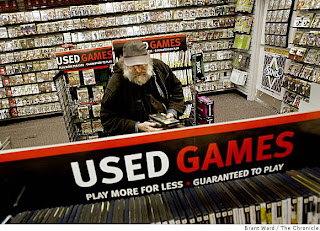 Subsequent to the unveiling of the Microsoft Xbox One, what seems to be the most-discussed feature of the console is its apparent ability to lock out second hand games.
Subsequent to the unveiling of the Microsoft Xbox One, what seems to be the most-discussed feature of the console is its apparent ability to lock out second hand games.
Though Microsoft has so far failed to properly clarify what all this lockout means, the technology is in the console. Naturally, this has the more vocal elements of the gaming community in an uproar.
To clarify before we begin – I’m not necessarily defending the use of technology to block used games. There are, in fact, solid research and commercial arguments for why it is a very bad idea to prevent the second hand sales. Two academic researchers, Masakazu Ishihara and Andrew Ching, studied the impact that the removal of second hand sales would have on the Japanese games market, and came to the conclusion that without a price reduction on the average RRP of games by a third (which would increase publisher profit by 19 per cent after blocking used games), publisher profit would drop by 10 per cent by blocking used games. So the research is there to suggest that publishers have an ultimatum – either drop the price of games and block used games, or block used games and lose profit (thanks to Gaming Momentum for highlighting the report).
Boiled down to its simplest, it’s capitalists market dynamics at work; publishers set the highest price that they think a market can bear, and consumers vote with their wallets if that is too much. Currently the second hand market allows prices to be inflated somewhat because consumers buy the games knowing there’s the ability to resell to recoup some of that initial investment.
That’s the commercial argument. It’s one that I see argued very little in the broader gaming media. Instead, we’re seeing lesser or greater rants from websites and blogs that essentially boil down to “I like games cheap, so you should let me by them second hand.”
For just one example, I’ll point you to Rebel Gaming’s “Open Letter To Games Publishers“. I’ve picked it because it’s a generally good, reasonable line of argument that argues a useful alternative to blocking used game sales; in other words the author clearly recognises that the publishers do have a right to profit. But there’s one paragraph in particular that I’d like to draw attention to, because it represents an attitude that is everywhere within the games industry, but it’s a fundamentally entitled way of thinking;
“You see, there comes a time when some of us gamers simply can’t afford to buy your games at their full, brand new, retail price of $60. In these occasions, we look to the used games section of our local gaming specialty [sic] store. Don’t get it wrong, if we could always afford to buy your games brand new we likely would, but sometimes saving money is more important. Life has a habit of draining our finances and so sometimes used games are a blessing for those of us looking for a little bit of escapism from the harshness of life.”
At its core, the argument here is “I’m not always able to afford your product, but I deserve it anyway.” It’s a common attitude. The thing is to all the people that think this way, you actually don’t. Games – in fact, entertainment in general – is not a human right. Unlike food, shelter, clean water and education, the industrialised world does not recognise your right to play games.
Classed as a luxury good as they are, the people who make games can charge whatever they like for them, and people can exercise their right to either buy the game at that price, wait in the hopes they can acquire it cheaper at a sale, or not buy the game at all. The closest thing that people have to a right to second-hand games is the legal right in many countries to sell physical products that they’ve bought. Microsoft’s system, from what information they’ve clarified, allows for that. It’s just that Microsoft and its publisher partners are going to get some money from the transaction as well – earning money from a product that a company produces is a right.
I’m not suggesting that people should like the idea of a console that blocks second hand sales. That would be the point where you exercise your right to not buy a product you don’t like. Simple, really. Or find a better line of argument than “because I like cheap stuff,” because frankly, it’s a flawed argument that assumes you have rights to stuff that you really don’t.






